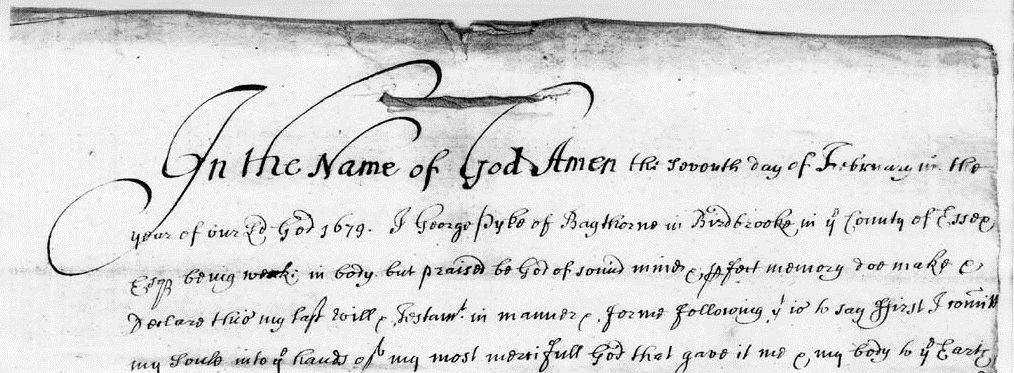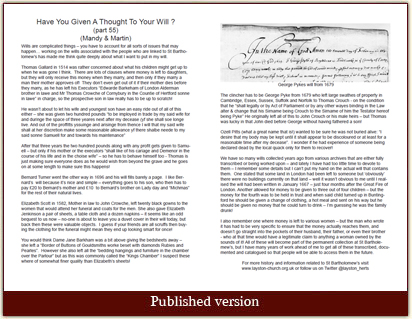Martin & Mandy
Wills are complicated things – you have to account for all sorts of issues that may happen… working on the wills associated with the people who are linked to St Bartholomew's has made me think quite deeply about what I want to put in my will.
Thomas Gallard in 1514 was rather concerned about what his children might get up to when he was gone I think. There are lots of clauses where money is left to daughters, but they will only receive this money when they marry, and then only if they marry a man their mother approves of! They don't even get out of it if their mother dies before they marry, as he has left his Executors "Edwarde Barkeham of London Alderman brother in lawe and Mr Thomas Crowche of Cornybury in the Countie of Hertford sonne in lawe" in charge, so the prospective son in law really has to be up to scratch!
He wasn't about to let his wife and youngest son have an easy ride out of all of this either – she was given two hundred pounds "to be imployed in trade by my said wife for and duringe the space of three yeares next after my decease (yf she shall soe longe live. And out of the proffitts yssuinge and arisinge from thence I will that my said wife shall at her discretion make some reasonable allowance yf there shalbe neede to my said sonne Samuell for and towards his maintenance"
After that three years the two hundred pounds along with any profit gets given to Samuell – but only if his mother or the executors "shall like of his cariage and Demenor in the course of his life and in the choise wife" – so he has to behave himself too - Thomas is just making sure everyone does as he would wish from beyond the grave and he goes on at some length to make sure this happens!
Bernard Turner went the other way in 1696 and his will fills barely a page. I like Bernard's will because it's nice and simple – everything goes to his son, who then has to pay £20 to Bernard's mother and £10 to Bernard's brother on Lady day and "Michmas" for the rest of their natural lives.
Elizabeth Scott in 1582, Mother in law to John Crowche, left twenty black gowns to the women that would attend her funeral and coats for the men. She also gave Elizabeth Jenkinson a pair of sheets, a table cloth and a dozen napkins – it seems like an odd bequest to us now – no-one is about to leave you a duvet cover in their will today, but back then these were valuable objects. I guess if your friends are all scruffs then buying the clothing for the funeral might mean they end up looking smart for once!
You would think Dame Jane Barkham was a bit above giving the bedsheets away – she left a "Border of Buttons of Gouldsmiths worke beset with diamonds Rubies and Pearles". However she also left all the "bedding hangings and furniture in the chamber over the Parlour" but as this was commonly called the "Kings Chamber" I suspect these where of somewhat finer quality than Elizabeth's sheets!

The clincher has to be George Pyke from 1679 who left large swathes of property in Cambridge, Essex, Sussex, Suffolk and Norfolk to Thomas Crouch - on the condition that he "shall legally or by Act of Parliament or by any other wayes binding in the Law alter & change that his Sirname being Crouch to the Sirname of him the Testator hereof being Pyke" He originally left all of this to John Crouch or his male heirs – but Thomas was lucky in that John died before George without having fathered a son!
Ozell Pitts (what a great name that is!) wanted to be sure he was not buried alive: "I desire that my body may be kept until it shall appear to be discoloured or at least for a reasonable time after my decease". I wonder if he had experience of someone being declared dead by the local quack only for them to recover!
We have so many wills collected years ago from various archives that are either fully transcribed or being worked upon – and lately I have had too little time to devote to them – I remember some details but I can't put my hand on the actual will that contains them. One stated that some land in London had been left to someone but 'obviously' there were no buildings currently on that land – well it wasn't obvious to me until I realised the will had been written in January 1667 – just four months after the Great Fire of London. Another allowed for money to be given to three out of four children – but the money for the fourth was to be held in trust and when said child turned up in Buntingford he should be given a change of clothing, a hot meal and sent on his way but he should be given no money that he could turn to drink – I'm guessing he was the family drunk!
I also remember one where money is left to various women – but the man who wrote it has had to be very specific to ensure that the money actually reaches them, and doesn't go straight into the pockets of their husband, their father, or even their brother - who at that time would have a legitimate claim to anything a woman owned by the sounds of it! All of these will become part of the permanent collection at St Bartholemew's, but I have many years of work ahead of me to get all of these transcribed, documented and catalogued so that people will be able to access them in the future.
For more history and information related to St Bartholomew's visit www.layston-church.org.uk or follow us on Twitter @layston_herts

 |
|
 |

